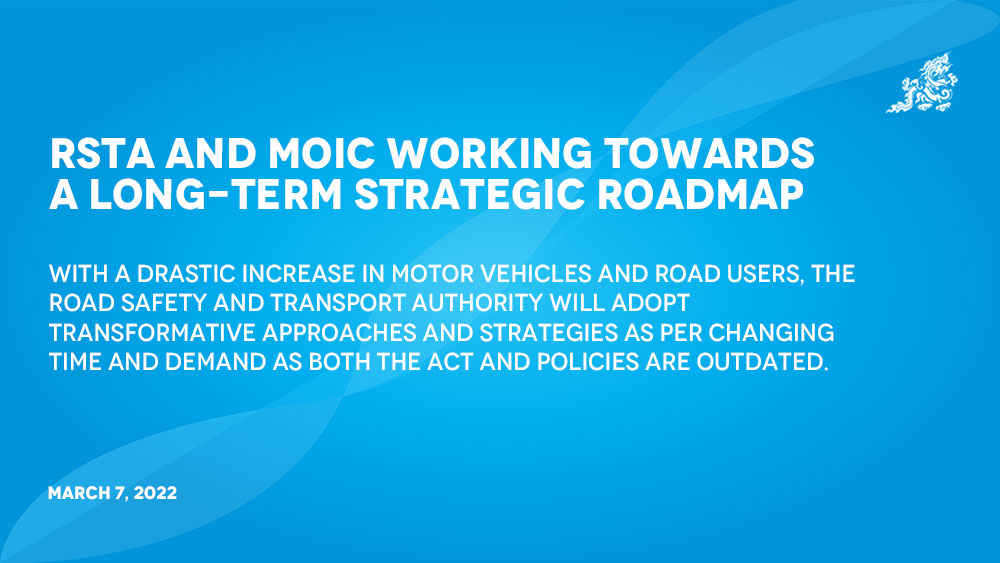Phub Dem
With a drastic increase in motor vehicles and road users, the Road Safety and Transport Authority will adopt transformative approaches and strategies as per changing time and demand as both the Act and policies are outdated.
According to information and communication secretary, Phuntsho Tobgay, it was time to overhaul the outdated RSTA Act of 1999 and transport policy 2006 as it provides limited perspective.
“The authority and the ministry is coming up with a comprehensive road safety strategy,” he said.
According to the secretary, the existing policy and regulation became outdated. However, he said that RSTA has been working on a comprehensive road safety roadmap to address the loopholes and inconveniences.
He said the old policy focused only on conventional surface transport.
The number of motor vehicles in the country increased from about 13,000 in 1997 to 119,636 by 2021.
Phuntsho Tobgay said MoIC and RSTA are in the process of reviewing the document to develop the surface transport strategic roadmap, which will provide overall guidance for the surface transport sector development. “The trend in the transport sector will continue even as we explore other modes of surface transport.”
He said the roadmap is expected to ensure the transport sector is resilient, sustainable and futuristic.
According to RSTA, the strategy document would emphasise on the importance of alternative modes of transport and emerging technologies.
The secretary said that it would explore the future scope of alternate modes of surface transport systems such as cable cars or ropeways, inland waterways, railways and e-mobility strategies to address the country’s surface transport needs in the long term. “Bhutan already experimented with the inland waterways to export quarry materials to Bangladesh. The country has to include railway and e-mobility systems as Bhutan cannot remain stuck with conventional surface transport forever.”
He said that investment in such a system will become a part of the nation’s strategic infrastructure development and provide a robust transport system which would lead to a reduction in pollution, congestion, road fatalities and travel time.
The country’s long-term strategic vision for the development of the transport sector is guided by the document “Bhutan Transport 2040 Integrated Strategic Vision”, which was prepared in 2011.
RSTA officials said they are currently revising the Transport Policy 2006 to include both the present and future trends of surface transport in the country.
They said the policy will guide the authority’s way forward to achieving the country’s organisational and national goals concerning surface transport sector development.
The Road Safety and Transport Regulations 2021 replaced the 1999 regulations as it could not address the changing needs. The new regulation will come into effect from July 2022.
RSTA’s chief transport officer, Sithar Dorji, said the regulation was supposed to be implemented from January this year, but was deferred by six months to debrief the officials and advocate on it. “We already completed an awareness programme for the officials.”
Sustainable Surface Transport System
According to RSTA officials, one of the emerging priorities in the surface transport sector is e-mobility in line with the international commitment to remain carbon neutral and to foster a sustainable transport system.
They said the country has already made the initial steps towards promoting low carbon vehicles.
The sustainable Low-emission Urban Transport Systems project, funded by the Global Environment Facility (GEF), promotes low emission electric vehicles. Under this initiative, the government is replacing 300 internal combustion engine taxis with EVs by the end of 2022 and setting up charging stations.
As of December last year, there are 248 electric vehicles registered in the country.
A total of 28 charging stations (15 fast chargers and 13 Semi-fast chargers) are installed in 15 locations covering Paro, Punakha, Wangdue, Thimphu, Haa and Chukha Dzongkhags through the GEF funding and funding from the Bhutan Trust Fund for Environmental Conservation (BTFEC). Further, there are already five charging stations installed through JICA assistance.
“Works are in full swing for installing charging stations in the remaining 14 Dzongkhags. The installation of charging stations is targeted to be completed by the end of 2022,” an official said.


